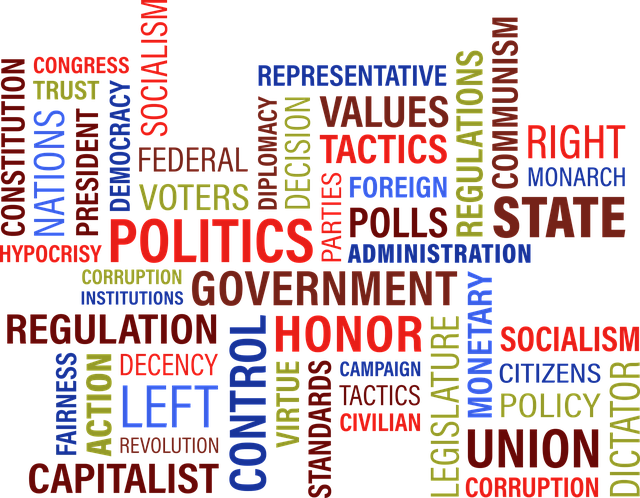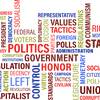clear

source:
Maialisa
If citizens have no concept of politics, then the society they live in suffers. And that's the biggest reason for politics to be studied in school. Unfortunately schools are controlled by government to varying degrees at local and national level, and governments tend to have strong ideas about what kind of political ideas they'd like students exposed to. And that doesn't just affect politics as a classroom subject, it shapes the way other subjects are taught - the texts used in literature classes, and the issues raised in history lessons, can have political ramifications. Many right wing thinkers would be happier that British history be taught in terms of kings and queens, and not the reasons those kings and queens have power. Politics as a subject is about challenging presuppositions - who says that you have to obey the person with the fanciest clothing who sits on a gold chair? Why does money that people make for their jobs get taken to pay for things they disagree with, whether nuclear arms or abortion? Teaching politics teaches people to ask questions, and that's why those in power will always be wary of it - wherever they lie on the political spectrum, you can be reasonably sure they do lie...
 2
2
clear
One thing associated with the younger generation is a lack of willingness to get out and vote at general elections, dubbing them the "disillusioned youth". Surely something needs to done about this. I believe the answer to getting young people more interested and actively engaged with politics, is to teach the basics of politics in schools - and before A Levels.
If you don't grow up in a family who is passionate about the electoral system, or stumble yourself across a subject that gets your blood boiling, then it's fair to say you'll probably find yourself quite detached from politics as a child. Surely therefore, there should be a responsibility within schools to give an education on the basics of politics. Politics rules the way we live, our values and our spending habits. It's vital for the public to have a say in who runs the country, and what values are put upon us; but if you don't grow up understanding politics, then when would the point come that you decide to take an interest. If young people are taught in secondary schools even as little as how the voting system works, then perhaps when they reach the age of 16 they would be interested in having their voice heard.
 1
1
clear
I think it's a good idea in theory, bad in practice. It should not be mandatory. It should be definitely offered as some type of extracurricular club or something, but the school only teaches it if they WANT to. Even if it's supposed to be non-partisan, unbaised politics, it could turn bad if the schools are mandated to do it. My school does it, but they aren't required to, so it helps maintain its neutrality. If it's mandated, the government could also mandate what be taught , and the politics that are taught would roughly correspond with the political stance of the government at that time.
It's easy to say "politics" should be taught, but what is meant by this term in this context? Are we talking about teaching students how voting works and how laws are made and governments elected? Because that's already taught.
Or are we talking about teaching them how society works, what's needed for a country to be successful, and what is and isn't politically sensible. Because that isn't taught, but it's basically impossible to teach it in a politically neutral way.
Teens are our future Politics should be taught in high school. If your old enough to drive and to vote, you should be able to handle politics. I don't know why society looks down on politics!!
 0
0
clear
 Wafa Benizid
6 years, 11 months ago
Wafa Benizid
6 years, 11 months ago
A politically-enlightened younger generation is a cornerstone of democracy. One of the most insidious aspects of the Taleban fundamentalists active in Afghanistan and northern Pakistan is the frequency with which they have destroyed schools and impeded education, particularly for females. But this nihilistic activity merely highlights how important it is to keeping promoting channels that allow young people to learn.
After a lengthy period of what could be termed the 'status quo', the UK is currently in considerable turmoil. 2014 saw a referendum on Scotland separating from the Union, and this represented the first time 16-17 year olds had been granted the vote, a much higher percentage of whom exercised this democratic right compared to adults. Since then there has been a General Election in 2015 (with another imminent), as well as the most seismic event to hit British politics for decades, the vote to divorce from the European Union. Politics has never been more all-pervasive in Britain, and it is a subject that is increasingly grasping the imagination of younger minds who may previously have felt disconnected from the 'stuffy' environment of Westminster.
State schools teach religion as in inclusive subject, stressing to pupils the diversity of faiths in today's multicultural society, and that there are laws to outlaw discrimination on the basis of belief. Politics should be taught in the same non-partisan way, in order for youngsters to grasp how important this will be in shaping their lives in future.
 0
0
clear
Young people need a better understanding of Politics
Politics plays such a large part in how our society is formed. Without an understanding of it young people are more likely to become disengaged or even elect people based solely on personality or media/public opinion, without taking notice of any possible party affiliation, policy/voting records, political and social beliefs or manifesto. Teaching children early on about the working of the political system, it's history and the variety of political beliefs and theories is important if we want to live in society where people are interested and engaged with politics.
Yes, yes politics should be taught in schools, but more importantly it should be taught in the home. Studies show that children are more likely to be involved in the democratic system if their parents are, it is simply a matter of education and environment. The responsibility lies not only with the teachers of these young minds, but the family. It is up to them, to shape their minds and to spark a desire to make a difference. I urge young generation to do one simple thing:care. Do not sit in a dark room playing video games, while the world crashes around us. Stand up, scream, shout, let your voice be heard. But more importantly, we must teach the generation of tomorrow to vote. VOTE!
 0
0
clear
In my opinion, politicians should all have minimum of 2 degrees in their area of government work. For ex., minister of economies should and could have a phd in economics. Same goes for other type of government officials.
I think if this would be true, education would help government officials to become less corrupt and put in more effort to work for their people instead of just helping themselves or simply being corrupt.
It is everyones duty to ellect the leaders they want to have and therefore politics should undergo university courses.
 0
0
clear
 Ignas Mikalauskas
5 years, 8 months ago
Ignas Mikalauskas
5 years, 8 months ago
I am a strong supporter of the idea that politics or even better - civil society education shall have more significant part in schools' programmes, especially in countries like mine - Bulgaria where it could be developed a lot more. However, of great importance is the subject to be taught in an impartial and interactive way. Otherwise it can easily have the opposite effect. This kind of knowledge is valuable since the young generations are the ones who will lead and vote tomorrow. It is difficult to participate in elections or the political life if you do not know how this system functions.
 0
0
clear
no schools don't need to be teaching you politics they should be teaching you something you are later going to use in life. for example schools should be theaching life skill and how to pay your bill and how to get a job not to be geting taught someing that is not going to help you in life.where in life would you use politics again no where is the answer so why should we get taught something in school that you are never going to use again in your day to day life
 0
0
clear
 Qumarii Huntesmith
5 years, 7 months ago
Qumarii Huntesmith
5 years, 7 months ago
I THINK IT SHOULD
 0
0
clear
I think it's really hard for people to get a thorough grasp on anything - languages, sports, painting, whatever - if they haven't been taught it first, and preferably from a young age. Yes, you can teach yourself stuff, but you'll struggle and probably make mistakes along the way. So why does it make sense that you should go to the polling booth as a teenager and know exactly who you should be voting for and why? Politics is complicated, and I don't think it helps that it is seen as impolite to discuss it in the family or among friends, or reveal who you voted for. If there is no frank and open discussion of the issues that politicians promise the address, and nobody teaches children the basics, why would they feel engaged to vote? The most you might hope for is a vote based on a politician's perceived personalitly or the way they look. So yes, I think teaching politics in schools is a good idea.
 0
0
clear

Sign up to post or vote on answers.
Improveo will help systemize your knowledge.

 AdrianR
AdrianR
 King Jay
King Jay